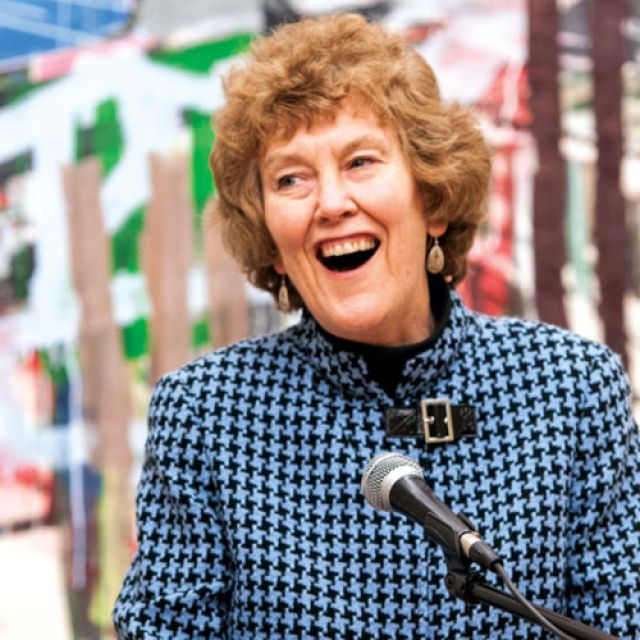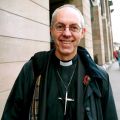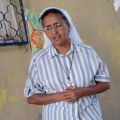NEWS
TORONTO - The difference between right and wrong could be the difference between life and extinction as Earth’s climate continues to spiral out of control, a Yale University professor of forestry and religious studies told a Toronto audience Nov. 9.
Mary Evelyn Tucker is the director of Yale’s Forum on Religion and Ecology and was a frequent collaborator with the late Passionist father of ecotheology Fr. Thomas Berry. Speaking on “Future Generations and the Ethics of Climate Change” at the invitation of the University of St. Michael’s College’s Elliott Allen Institute for Theology and Ecology, Tucker made the case for an alliance between the worlds of religion and science.
While science is more comfortable with descriptive than prescriptive words about nature and cautious scientists have been reluctant to tell politicians what to do, religion has only very recently begun to address the environmental crisis and ecotheology is still rarely spoken of in seminaries. However, the state of the world’s natural systems demands the best thinking of both religion and science, said Tucker.
“We have to say continually that religion is necessary but not sufficient. We have to develop partners in science, in law, in policy,” she said.
“We need humility. We don’t have all the answers because we were late in coming to this.”
Even if there has been a widening gap between science and religion in the modern era, the world now needs the “deep spiritual resources” of world religions that have dedicated millennia to thinking about right, wrong and the common good. Religion has the ability to teach humanity to value nature as the source of life, rather than a collection of resources to be fed into the gross domestic product of nations, she said.
“We have to see environmental degradation as an ethical issue,” she said. “Until now degradation has been seen as the inevitable cost of economic growth.”
The beginnings of an ethics that addresses climate change would be a serious look at distributive justice, according to Tucker. There are already winners and losers around the globe as sea levels rise, droughts devastate farm land and more violent storms create climate refugees from New Jersey to Bangladesh. But distributive justice should also mean extending the reach of human rights to future generations who will have to live in the environment this generation leaves them.
While an ethic of rights might set minimum standards, drawing lines which must not be crossed, a true environmental ethic would concern itself with much more than the minimum. As nature always seeks flourishing, so should our ethics.
Our ethics should be based on a clear-eyed view of human beings as a “small but indispensable part of a 14-billion-year evolution,” she said. “We need an ethic that is culturally aware but also universally compelling.”
@PopeBenedict to be up by year’s end
By Carol Glatz, Catholic News ServiceVATICAN CITY - Once the Vatican launches Pope Benedict XVI’s official Twitter feed before the end of the year, it’s hoped all the fake papal tweets will cease and desist, said a Vatican official.
There are dozens of unofficial @PopeBenedict handles and usernames in a number of different permutations and languages on Twitter; many are using an official portrait of the Pope as their avatar and some boast thousands of followers.
Some of these Twitter accounts are being run “obviously by people of goodwill” who tweet about real news and activities of the Pope, said a Vatican official who requested anonymity.
However, “We hope they will give up when they see the official site is up,” the official said.
The Vatican will have a verified and authenticated papal Twitter account, which will help users distinguish the official Pope Benedict stream from the imposters, the official said. No specific date has been set for its launch other than “before the end of the year,” he added.
Unfortunately, there are some phony accounts “that aren’t very helpful” because they obviously don’t have the best interest of the Pope or his teachings in mind.
For example, some bogus feeds produce off-colour or inappropriate commentary. But if it’s obviously satire, comedy or parody, “nothing can be done about that because of freedom of expression,” the official said. Yet, there’s little risk of people mistaking those accounts with the official account, he added.
However, if an account holder is using the Pope’s name with the aim of misrepresentation, misleading users or “username squatting” in order to prevent the Vatican from using the name or to illicitly offer the account name for sale, “then Twitter can close them down,” he said.
All the details about the official Pope Benedict Twitter account have not been hammered out, he said, such as which Twitter handles will be used and if there will be one username or different handles in different languages.
Feeds will be offered in five or six major global languages, though it’s not sure if Latin — the official language of the Church — will be one of them, he added.
Even though the Pope won’t be physically typing and sending the tweets, each message will be approved by the Pope himself, he said.
The idea of having an official papal Twitter account has been bouncing around for quite awhile.
To date, the Vatican offers a handful of official Twitter feeds in different languages, including Vatican news @news_va_en; Vatican communications @PCCS_VA; and the social network @Pope2YouVatican.
Pope Benedict sent his first ever papal tweet in 2011 when he inaugurated and launched the Vatican’s online news portal, www.news.va, which aggregates news content from the Vatican’s newspaper, radio, television and online outlets.
“Dear Friends, I just launched News.va. Praised be our Lord Jesus Christ! With my prayers and blessings, Benedictus XVI,” the Pope said with a tap on an iPad, sending the message onto the news site’s Twitter account.
Pope Benedict has long urged Catholics and Catholic media to use the Internet and social networks for evangelization.
The Priests on hand to help Salt + Light mark 10 years
By Ruane Remy, The Catholic RegisterTORONTO - Irish singing sensations The Priests will headline the Venite Adoremus 2012 Christmas Concert to celebrate 10 years of media ministry by Salt + Light Catholic Media Foundation.
The Priests became global stars after their debut album in 2008 became the fastest selling classical debut of all time.
“As we enter our 10th year, I could think of no better way to celebrate this milestone than with a musical concert that features The Priests of Ireland,” said Fr. Tom Rosica, Salt + Light CEO.
“Several years ago, when we were asked at Salt + Light to promote (The Priests) in Canada, I gladly accepted and got to know the three men well. They are living examples of the New Evangelization and their message and music fit in very well with our mission at Salt and Light.”
According to Daniel Torchia, Salt + Light’s director of partnerships, “We’ve held two concerts with them (The Priests) at St. Paul’s Basilica in the past, which would be considered almost a warm up to this event.”
He describes these past performances as “smaller” and “more brief.” But the Dec. 6 concert at Toronto’s Koerner Hall “is really a full-fledged concert for classical music lovers, as well as the Catholic community.”
Rosanna Riverso and The Amabile Youth Singers, a group of about 40 girls ages 12 to 18 from London, Ont., will also be performing.
“It has been in incredible period of hard work, growth, evangelization, creativity and hope for the Church in Canada and far beyond,” Rosica said reflecting on Salt + Light’s first decade. “I would have never believed 10 years ago all that the Lord has been able to do through us this past decade.”
For tickets and information see www.saltandlighttv.org.
Bishops ‘silent’ on social justice
By Michael Swan, The Catholic RegisterA “culture of silence” and deference to “political conservatism” has infected the Canadian Conference of Catholic Bishops (CCCB), charges the head of the Jesuit-founded Centre Justice et Foi (Justice and Faith) in Montreal.
In an open letter to CCCB president Archbishop Richard Smith, Elisabeth Garant said the elimination of the CCCB’s post of senior advisor for social justice, delaying and blunting the Canadian Catholic Organization for Development and Peace’s fall education campaign, inviting Immigration and Citizenship Minister Jason Kenney to a private meeting and not criticizing refugee policy reforms amount to a “serious step back away from the rich Church tradition of social justice.”
Garant’s letter will be on the agenda of the next CCCB executive committee meeting Nov. 27-28. Until then, the conference has chosen to make no comment.
Garant served five years as a member of the CCCB’s Commission on Justice and Peace. She accuses the bishops of cozying up to the Conservative government because, she said, the CCCB has not engaged the Canadian government on an issue of social justice since December 2010. At that time, Kenney dismissed a letter from the bishops’ justice and peace commission as another in “a long tradition of ideological bureaucrats who work for the bishops’ conference producing political letters signed by pastors who may not have specialized knowledge in certain areas of policy.”
“From that moment we observe a silence,” said Garant. “Why are we silent on things that are not our personal issues but that we think for the common good we need to talk about?”
She also questions the CCCB for laying off social justice advisor Francois Poitras in order to help get its finances in order.
CCCB General Secretary Msgr. Patrick Powers has said layoffs were necessary. “We have had to rethink the way we do things, to do more and to cost less,” he told Canadian Catholic News.
“When Msgr. Powers said that this responsibility (for social justice) will be spread among other lay people at the conference, I don’t know any of them who have the experience or the competence to deal with social justice,” she said.
Garant also disputes the CCCB’s explanation behind the delay of the Development and Peace fall campaign. In a joint letter, the CCCB and Development and Peace explained that the campaign was delayed and modified because “concern was expressed that elements of the original materials could be a source of division among bishops, priests, parishioners and donors.”
“They are saying they do that for the sake of some faithful who will be hurt,” said Garant. “There’s no real proof of what they are talking about.”
Garant has yet to receive acknowledgment of her letter from the CCCB or Smith. Smith was in Rome in early November.
Though the Centre Justice et Foi has autonomy, it remains a Jesuit apostolate with the full confidence of Canada’s French-speaking Jesuit fathers, said Garant.
Institutional chaplains to be licensed
By Michael Swan, The Catholic RegisterToronto - On the journey from a hospital bed back home, a patient may be visited by licensed doctors, licensed nurses, licensed psychologists, licensed pharmacists, licensed physiotherapists and a chaplain.
This is scheduled to change some time in 2014, when chaplains in Ontario hospitals, jails and other institutions will be licensed and held accountable to a professional college — just like doctors, pharmacists and nurses.
“People who work in spiritual care are really touching very deep, vulnerable places in people,” said Christine O’Brien, spiritual care trainee at Bridgepoint Health in Toronto. “There should be some regulation about training. It shouldn’t be simply that I have a nice background and I’m a nice person. There’s too much involved in what actually happens in patient care.”
The provincial government isn’t trying to regulate religion or oversee prayer, said Joyce Rowlands, the registrar of the Transitional Council of the College of Registered Psychotherapists and Registered Mental Health Therapists of Ontario.
“There are people in the province who are pastoral counsellors or spiritual care therapists, as some call themselves, who actively have wanted to be part of this process and become members of the new college,” Rowlands told The Catholic Register.
Chaplains, particularly those employed by hospitals, will want to be part of the college because hospitals will begin to make membership the minimum standard for working in their spiritual care departments. A 1991 law specifically rules out prayer and ritual as a form of therapy that the government needs to regulate. But anyone who enters into a specifically therapeutic relationship with people who suffer serious emotional, cognitive or psychological issues will need to be part of the new college when it’s up and running.
Chaplains employed by the Church to provide sacramental ministry, anything from delivering communion to hearing confessions, will be exempt.
O’Brien is taking a 12-week, intensive Clinical Pastoral Education (CPE) program at Bridgepoint, a major rehabilitation hospital in Toronto. O’Brien already has a Master of Divinity degree from Toronto’s University of St. Michael’s College and will need four such units of CPE training plus a course on the legal responsibilities and limits of caregivers before she qualifies to be licensed by the new college. While the college can’t dictate who the hospitals hire, nobody in the field believes hospitals will hire chaplains who aren’t members of the college.
In the early going, working under a supervisor, O’Brien sees how her work fits into a team of professionals working toward healing for patients.
“We’re talking about talking with patients who are in a vulnerable state, because they are ill, about issues of meaning and purpose in their lives,” she said. “About perhaps whether they believe in an afterlife. Are they feeling judgment? Are they terribly frightened because they think of their mortality? Their doctor doesn’t want to talk about their mortality and all those issues. These are spiritual issues.”
Catholic clergy and volunteers who visit Bridgepoint are also part of the bigger, healing picture. Even though O’Brien is Catholic she can’t do her job and deliver communion to all the Catholic patients. Neither can she say Mass or hear confessions. But she can help people to see their lives in a broader spiritual context — an insight that will make Mass and sacraments less isolated events and more part of the fabric of life as patients heal.
But making chaplains into therapists might not be such a good idea, says Jesuit Father Desmond Buhager, Regis College lecturer in family therapy and pastoral counselling.
“It could be conceived of as a medicalization of the role of chaplain,” he said. “They’re part of a health care team, but we don’t start calling social workers occupational therapists. They simply aren’t. So why try to glom them (chaplains) together with psychotherapists? They’re not mental health workers... They’re chaplains.”
How people are held accountable matters, said Buhage. Spiritual care staffers, especially at hospitals, will find themselves part of a College of Psychotherapy and Registered Mental Health Therapist. The problem is they’re not psychotherapists, Buhager said.
“The idea of levelling everything to making chaplains all of a sudden psychotherapists or requiring them to be mental health therapists is inappropriate,” said Buhager, himself a registered psychotherapist in the United States. “It’s weird. Excuse me. We (psychotherapists) did five or six or seven years of training as therapists with specific course curriculum and clinical hours of supervision simply to be treated the same as people who have done a few CPE units? Doesn’t sound right.”
The act which mandates the college was passed at Queen’s Park in 2007. It is one of five new health care colleges being created in Ontario. But the 2007 act can’t be proclaimed into law until regulations are in place. Trying to figure out how to regulate psychotherapy has been a huge challenge and the transitional council long ago abandoned hopes it would make an April 2013 deadline for establishing the new college.
“We spent two years trying to figure out, who are we regulating? What is the difference between these two titles (psychotherapist and registered mental health therapist)? What kinds of training and education does this very diverse spectrum of practitioners have? What should the requirements of registration be?” said Rowlands.
Psychotherapists will be required to complete 360 hours of supervised clinical training in a program that requires an undergraduate degree. RMHTs will more typically have community college training and 180 hours of supervised clinical work.
For spiritual care the usual standard is four units of CPE leading to specialist certification plus a Master of Divinity, Master of Theological Studies or equivalent degree.
Some psychotherapists have pushed for more stringent requirements — namely a masters degree in psychotherapy or a related counselling discipline, plus time spent in supervised clinical work. The problem with that is there’s only one masters psychotherapy degree in all of Ontario — Wilfrid Laurier University’s MA in theology with a specialization in spiritual care and psychotherapy. It also leaves out Jungian, Gestalt and other kinds of therapists who train in independent institutes that don’t award a masters degree.
However the work is labelled and licensed, O’Brien is convinced it’s necessary work.
“It’s a grace. It’s a satisfaction. Grace is in knowing that somehow I’ve been able to journey along even in a small way with this person who is in great need,” she said.
Bishop says Israel, Hamas must make tough decisions to end violence
By Judith Sudilovsky, Catholic News ServiceUPDATED 19 NOVEMBER 2012
JERUSALEM - The Israeli government and leaders of Hamas must make courageous decisions to end the violence that has once again forced residents of Southern Israel into their bomb shelters and residents of the Gaza Strip into their homes, said Auxiliary Bishop William Shomali of Jerusalem.
"We are sad for this escalation. It does not lead to peace but only leads to more violence," Bishop Shomali told Catholic News Service Nov. 16. "This is a vicious circle of violence and (retaliation) is really not the solution. Courageous decisions need to be taken from the part of Israel and also on the part of Hamas not to remain in the circle of retaliation."
He said simultaneous international intervention from Egypt and the United States is needed for the violence to stop.
"Left alone, Israel and Hamas will remain in a circle of retaliation," he said.
"The most important thing is to find a comprehensive solution to the whole Palestinian-Israeli conflict; if not, we will remain with the same retaliations and the same problems," he said.
Israel's Ministry of Foreign Affairs said 120 rockets were fired into southern Israeli communities from Nov. 10 to Nov. 14, when Israel launched air strikes that targeted and killed Hamas military leader Ahmed Jabari. More than 90 Palestinians and at least three Israelis had died in the violence as of Nov. 19.
In a Nov. 15 statement, Jerusalem's Latin Patriarch Fouad Twal expressed his deep concern at the escalation, reiterating that violence will not solve the crisis. Only a global solution can find a resolution to the conflict, said a statement from his office.
"In this particular tense context, the patriarch is in solidarity with all victims who are at the center of his thoughts and prayers," the statement said. "He also prays that all those in position of responsibility in this situation do not give in to hate."
Throughout the crisis Zion Evrony, Israel's ambassador to the Holy See, was making phone calls to Vatican officials and journalists to explain his country's position.
"The Palestinian people are not our enemy; Hamas and the other terrorist organizations are," he told Catholic News Service Nov. 19. "We deeply regret the loss of life of non-involved civilians."
The ambassador said the Israeli government made "tens of thousands of phone calls" and dropped leaflets in Gaza advising people to stay away from Hamas organization buildings and rocket launch sites before it began its retaliation bombing.
Israel cannot "sit idly by and not respond" when Hamas now has rockets and missiles capable of striking Tel Aviv and Jerusalem, putting an estimated 3 million people at risk.
The current tension will end, he said, only when Hamas stops firing missiles and rockets into Israeli territory. But in the end, the real solution to the ongoing conflict will have to be "the existence of two states living side by side in peace."
Sami El-Yousef, regional director for the Catholic Near East Welfare Association's Pontifical Mission office in Jerusalem, said he has been in touch with the organization's partners in the Gaza Strip and it appears that Israel is specifically targeting the Hamas leadership, as opposed to the 2008 incursion that involved large-scale destruction of civilian residential areas.
"So far in this early stage we are not seeing the large-scale destruction (we saw in 2008). It remains to be seen if ... it will escalate to much greater damage," El-Yousef said Nov. 16. As many as 1,400 Palestinians died in the 2008 incursion.
He noted that Egypt is also under a different regime, and it is likely that the borders to Gaza will be more open and accessible to moving goods and services and allow people to reach hospitals. After the election of the Hamas government in 2007, Israel blockaded the Gaza Strip, and Egyptian President Hosni Mubarak enforced the blockade during the 2008 attacks.
El-Yousef said civilians in Gaza rushed to bakeries to buy bread following the assassination of the Hamas leader, and many food stores have run out of supplies. People are under curfew and are very concerned about any possible ground operation escalating the violence.
"The next couple of days will be critical as to where this is heading," he said. "Based on that, we need to assess the situation and decide how to respond."
El-Yousef said he had been in Gaza three weeks earlier and "things were looking up." CNEWA was hopeful that staffers would be able to look at sustainable issues where people could take over their lives and move out of the humanitarian needs, he said.
The situation will continue like this, he said, "unless both sides are willing to take difficult decisions."
He said Israel was wrong to think that if it can get rid of a Hamas leader, the whole organization will collapse.
"There will be someone to replace him ... and they will have to deal with someone much worse. With each possible new person, they are dealing with a more and more extreme leadership, and the likelihood of reaching a solution becomes more difficult," he said. "The cycle gets worse and worse. This is going nowhere and just creating more hatred."
He said he hopes that new leaders in the Middle East might play a positive role in calming things down so that a lasting solution can be found.
"What we have now is conflict management rather than resolution," he said.
- - -
Contributing to this story was Cindy Wooden at the Vatican.
Federal government seeks private partnerships for social services
By Deborah Gyapong, Canadian Catholic NewsOTTAWA - The federal government is soliciting ideas from the business and charitable sector on how to best solve intractable social problems such as homelessness, hunger and drug abuse.
“Here’s the straight talk: we can’t fund every single, solitary service that people want, without regard for the taxpayers’ ability pay for it,” Human Resources and Skills Development Minister Diane Finley told a group of business and NGO leaders in Toronto Nov. 8.
“It’s time for us to unleash individual initiative so that those who are motivated can help others and those who need help are given the opportunity to take more responsibility to help themselves,” she told the fifth annual Social Finance Forum sponsored by MaRS, a pioneer organization bringing business and NGO leaders together to find innovative ways of tackling social issues.
Finley asked for ideas on how to leverage business and NGO expertise with government funding that would reward measurable results in achieving goals. The government also proposes rewarding “social finance” from the private sector in the form of Social Impact Bonds. These are contracts where the government agrees to pay a charity or NGO an amount of money if agreed upon results are achieved.
“Payment from the government is tied to program outcomes,” Finley said. “If — and only if — the agreed upon outcomes are achieved, the government pays the investors the agreed premium, as well as the original investment.”
Finley announced the launch of a web site to receive innovative ideas for tackling social needs at www.actionplan.gc.ca.
“This is an interesting model,” said Citizens for Public Justice (CPJ) executive director Joe Gunn.
“Will it add anything to what we’re all doing to work against poverty?”
The projects likely to be taken on by the private sector would tend towards those which have more of a possibility of success, leaving behind more difficult projects where, over the short term, it is more difficult to see progress, he said.
Gunn challenged the view government programs do not work in addressing poverty. The CPJ’s Poverty Trends Scorecard — Canada 2012 released in October showed government intervention makes a difference, particularly in rates of seniors living in poverty. A generation ago 30 per cent of seniors lived in poverty, but after government programs targeted this issue, only five per cent of today’s seniors are poor, he noted. Single women with children are also faring better, he said.
It is good that the government recognizes the need charitable organizations and NGOs have for government support in accomplishing their missions, Gunn said, and he would like churches to push for higher levels of taxation to cover the cost.
“Taxes are what we pay for a civilized society and how we care for each other,” Gunn said, noting higher taxes could pay for better home care, pharmacare and other programs to bring about more equity. “I don’t think the private sector or charitable sector can get us there.”
Dave Quist, executive director of the Institute of Marriage and Family Canada (IMFC), said Finley’s approach recognizes that charitable organizations can do a better job as they are more specialized in helping the downtrodden. But he warned rates of charity are declining as are rates of volunteerism. Families are under stress trying to pay the mortgage and buy groceries, he said, and parents often don’t have much free time.
Christians differ in how best to address social problems, he said, indicating some concern that big government programs and high levels of taxation have contributed to the decline in private charitable giving and volunteering.
There is a “social gospel” view that looks to generously financed social programs that has prevailed in Canada, he said. Other Christians, such as those who are centreright, support a more capitalist or free-enterprise approach that sees the best solution to poverty in supporting conditions that help people get a good paying job, he said. “We look at the same problem but through different lenses,” said Quist. “The best poverty program is a good job and we see that in family life. When mom and dad have a stable income that family is much more stable; their marriage is much more stable. That doesn’t mean giving them money, but allowing them the dignity of meeting their own needs.”
Many Western countries have realized their generous social programs are not sustainable, he said.
New archbishop of Canterbury shaped by Catholics
By Simon Caldwell, Catholic News ServiceMANCHESTER, ENGLAND - The newly appointed leader of the world’s Anglicans is a former oil executive who said his spiritual director was a Catholic monk.
Bishop Justin Welby of Durham, who will become the new archbishop of Canterbury, did not name the monk, but told a Nov. 9 news conference at London’s Lambeth Palace that he was influenced by both Benedictine and Ignatian spirituality. He also told reporters that he would be voting in favour of the ordination of women as bishops when the General Synod will decide the matter at a two-day meeting beginning Nov. 19.
Welby’s appointment as the primate of England and the leader of the worldwide Anglican Communion was announced Nov. 9 following selection by the Crown Nominations Commission and approval of Queen Elizabeth II, the supreme governor of the Church of England. The 56-year-old will be enthroned as the 105th archbishop of Canterbury in Canterbury Cathedral March 21 in succession to Archbishop Rowan Williams, who leaves the post in December.
Welby has been described as an Anglican evangelical with sympathy for the Catholic tradition. A Nov. 9 press release by the Church of England said he has “frequently said that the Roman Catholic approach to Christian social teaching, beginning with the encyclical of Leo XIII’s Rerum Novarum, up to Pope Benedict XVI’s Caritas Veritate, has greatly influenced his social thinking.”
Welby told the Lambeth press conference he knew the Church of England was “facing very hard issues.”
“In 10 days or so the General Synod will vote on the ordination of women as bishops, and I will be voting in favour and join my voice in urging the synod to go forward with this change,” he said.
The archbishop-designate also noted that the Anglican Communion was divided over issues of sexuality but said that it would be wrong to tolerate “any form of homophobia in any part of the church.”
Visiting elderly, pope says 'it's wonderful being old'
By Cindy Wooden, Catholic News ServiceROME - Presenting himself as "an elderly man visiting his peers," Pope Benedict XVI visited a Rome residence for the elderly, urging the residents to see their age as a sign of God's blessing and urging society to value their presence and wisdom.
"Though I know the difficulties that come with being our age, I want to say, it's wonderful being old," the 85-year-old pope said Nov. 12 during a morning visit to the residence run by the lay Community of Sant'Egidio.
The residence includes apartments for independent living as well as rooms for those requiring more skilled care. Younger members of the Sant'Egidio Community volunteer their time assisting and visiting with the residents, who include an elderly couple from Haiti whose home was destroyed in the 2010 earthquake.
Walking with his white-handled black cane, the pope visited several of the residents in their rooms and apartments before addressing them and members of Sant'Egidio in the garden.
One of the residents, 91-year-old Enrichetta Vitali, told the pope, "I don't eat so much anymore, but prayer is my nourishment." She asked the pope to "pray that I don't lose my memory so I can keep remembering people in my prayers."
The pope told those gathered at the residence on the Janiculum Hill that in the Bible a long life is considered a blessing from God, but often today society, which is "dominated by the logic of efficiency and profit, doesn't welcome it as such."
"I think we need a greater commitment, beginning with families and public institutions, to ensure the elderly can stay in their homes" and that they can pass on their wisdom to younger generations.
"The quality of a society or civilization can be judged by how it treats the elderly," he said.
Pope Benedict also insisted on recognition of the dignity and value of all human life, even when "it becomes fragile in the years of old age."
"One who makes room for the elderly, makes room for life," the pope said. "One who welcomes the elderly, welcomes life."
The pope told the residents that he knows the aged face difficulties, especially in countries where the global economic crisis has hit hard. And, he said, the elderly can be tempted to long for the past when they had more energy and were full of plans for the future.
However, the pope said, "life is wonderful even at our age, despite the aches and pains and some limitations," he said.
"At our age, we often have the experience of needing other's help, and this happens to the pope as well," he told the residents.
Pope Benedict said they need to see the help they require as a gift of God, "because it is a grace to be supported and accompanied and to feel the affection of others."
World needs better tracking, disposal of weapons, Vatican official says
By Greg Watry, Catholic News ServiceVATICAN CITY - The international community must get serious about enforcing humanitarian laws that make it possible to secure or destroy explosive devices leftover from a war before those devices harm innocent civilians or fall into the hands of terrorists, a Vatican official said.
Archbishop Silvano M. Tomasi, the Vatican's representative to U.N. agencies in Geneva, addressed a U.N. conference reviewing compliance with an international agreement on the restriction and use of certain conventional weapons; the conference was held in Geneva Nov. 12-13.
The focus of the conference was on laws dealing with the tracking and disposal of "explosive remnants of war," such as landmines and roadside bombs.
Failure to implement the agreement, Archbishop Tomasi said, has meant that many explosive weapons are not monitored during a conflict or removed after a conflict ends. As a result, they fall into the hands of terrorist groups and criminal organizations, and pose a threat to innocent civilians, he said.
Any hesitation in documenting or removing the explosive remnants of war, the archbishop said, "means more victims and bigger economic and social costs, and long-term hampering of development."
In past and present conflicts, civilians' safety has not been a priority, and "international humanitarian law was merely a set of non-respected rules," he said.
Archbishop Tomasi called for full adherence to the international agreements and international cooperation in monitoring compliance. "This is the only way to protect the civilian population, and in some cases the national community as a whole, from the consequences of explosive remnants of war."
The international community has a moral responsibility to protect civilians from explosive weapons during and after conflicts, the archbishop said. "Civilians should not have to pay twice for the absence of a secure, free and peaceful environment."
Comboni nun works to help Eritreans tortured, raped en route to Israel
By Judith Sudilovsky, Catholic News ServiceTEL AVIV, Israel (CNS) -- Comboni Sister Azezet Kidane is fluent in Amharic, Tigrit, Arabic and Sudanese dialects, so she was a natural choice when a shelter for African refugees needed help.
It was only after the nun, known as Sister Aziza, began conducting interviews with Eritrean refugees that she realized the people she was talking to had been tortured.
"It is a horror story what is happening," she told Catholic News Service from the African Refugee Development Center's shelter for single mothers and pregnant women in a low-income neighborhood of Tel Aviv.
Shahar Shoham, director of migrants and statusless people at Physicians for Human Rights Israel, said the first clue that something was happening in the Sinai Peninsula was the condition in which refugees arrived at their clinic in Tel Aviv.
"They told us of torture and rape and we saw the scars of their torture. People who were shot by the Egyptian forces at the border started coming to our clinic," said Shoham.
"Sister Aziza is a blessing for us. People feel comfortable opening up to her," she said. "The torture continues even now. As we are speaking it is happening."
In two-and-a-half years, Sister Aziza has taken testimony from some 1,500 refugees. As the Eritrean nun taps on the doors of the rooms, women greet her with hugs and kisses; a young girl runs after her to clutch her hand as they walk down the street together.
"I can't say all of the people I've interviewed have been kidnapped and tortured, but most of them have been," she said as she sat underneath the shade of tree in a dusty lot next to the women's shelter. "Sometimes (the victims) can't even (recount) what happened to them and when you know (what happened) you can't repeat it, it is shameful that a human being could do such a thing."
Many of the women who arrive at the shelter are pregnant from rape.
Eritreans leave their country to escape poverty and forced military service for the authoritarian regime.
In October, a delegation from the U.S. Catholic Conference of Bishops' Committee on Migration visited Egypt and reported that Eritrean refugees were being apprehended by Sudanese enforcement authorities while en route to Egypt. The authorities turn the refugees over to members of the Rashaida tribal clan, who sell them to Bedouin tribesman in Egypt's Sinai Peninsula.
A statement by Kevin Appleby, director of migration policy for the USCCB, said some 700 refugees were in captivity in the Sinai in mid-October. The refugees are subject to systematic rape and torture, he said.
Egyptian and Israeli authorities are aware of the kidnapping rings but still the practice continues, he said. He urged the U.S. government to work with Egypt to identify the "torture houses," rescue the refugees and consider them for "expedited resettlement." He also said the U.S. should also encourage Israel to "uphold its responsibility as a signatory of the 1951 refugee convention and halt the practice of denying entry to refugees and deporting them to dangerous situations."
Physicians for Human Rights Israel reports that some 7,000 of Eritrean refugees have been held for ransom and tortured and raped at the hands of their Bedouin kidnappers. Another 4,000 people have died en route to Israel, either as a result of being smuggled, tortured, or shot by the Egyptian soldiers following a shoot-to-kill policy, the agency said.
Israel is building a fence along its 150-mile southern border, cutting off the refugees' escape from the Sinai into Israel. In March, Israel began building a new detention center in the south of the country; initially, the center will hold 8,000 people.
At the Tel Aviv shelter, two Eritrean women -- one visibly pregnant -- sit at a metal tray set with coffee cups and grinder in front of the open door of their sparsely furnished room. A blue-and-green checked kitchen towel protects the last of their traditional round ambasha sweet bread from flies.
The women offer visiting journalists a slice of ambasha, but they decline to be interviewed or photographed.
The refugees are tired of journalists and being interviewed, Sister Aziza said. They see no concrete results from all the interviews they have given.
"How many journalists, how many videos have been done but the world is silent," said Sister Aziza, who was named a 2012 Trafficking in Persons Report Hero by the U.S. State Department for her work exposing the situation. "Nothing changes, nothing gets better for them. It is only getting worse. They are disappointed with all the efforts."
Through Caritas Italy funding the Comboni sisters have helped the women open a nursery for the young babies at the shelter so the mothers can work. In a separate basket-weaving workshop, women use their traditional skills to create colorful cloth baskets they sell.
Sister Aziza's phone number, which is passed around by word of mouth, is available 24 hours a day to refugees, human rights workers, diplomats and Israeli government agencies. The Israeli Prison Authority often contacts her for advice about underage refugees.
The work of listening to the refugees' stories is difficult, she said, and all she can do is be there for them to listen and then listen some more. Just a few days earlier she had gone on a 10-day retreat with a silent order near Jerusalem in order to gather her strength together to continue the work she said.
"Without prayer, I could not do this work," she said. "I want people of the world to break the silence, but only God will be able to change the hearts of the people."











